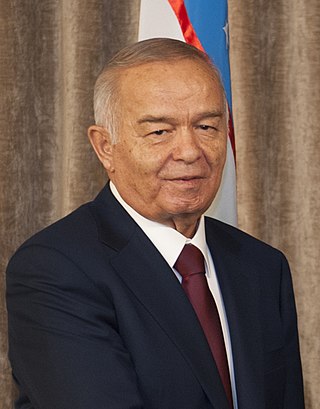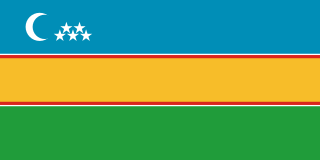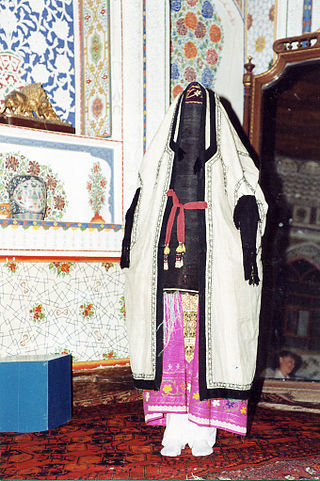Related Research Articles

Afghans or Afghan people are nationals or citizens of Afghanistan, or people with ancestry from there. Afghanistan is made up of various ethnicities, of which Pashtuns, Tajiks, Hazaras and Uzbeks are the largest. The two main languages spoken by Afghans are Pashto and Dari, and many Afghans are bilingual in speaking fluent Pashto and Dari.

Central Asia is a subregion of Asia that stretches from the Caspian Sea in the southwest and Eastern Europe in the northwest to Western China and Mongolia in the east, and from Afghanistan and Iran in the south to Russia in the north. It includes the former Soviet republics of Kazakhstan, Kyrgyzstan, Tajikistan, Turkmenistan, and Uzbekistan. Central Asian nations are colloquially referred to as the "-stans" as the countries all have names ending with the Persian suffix "-stan", meaning "land of".

Tajikistan, officially the Republic of Tajikistan, is a landlocked country in Central Asia. It has an area of 142,326 km2 (54,952 sq mi) and an estimated population of 9,750,065 people. Dushanbe is the country's capital and largest city. It is bordered by Afghanistan to the south, Uzbekistan to the west, Kyrgyzstan to the north, and China to the east. It is separated narrowly from Pakistan by Afghanistan's Wakhan Corridor. Tajiks form the ethnic majority in the country and their national language is Tajik; a Persian language that is closely related to the mutually intelligible dialects of Farsi and Dari of Iran and Afghanistan.

Uzbekistan, officially the Republic of Uzbekistan, is a doubly landlocked country with a population of nearly 35 million, making it the most populous country in Central Asia and the 17th-most populous country on the Asian continent. It is surrounded by five landlocked countries: Kazakhstan to the north; Kyrgyzstan to the northeast; Tajikistan to the southeast; Afghanistan to the south; and Turkmenistan to the southwest. Its capital and largest city is Tashkent. Uzbekistan is part of the Turkic world, as well as a member of the Organization of Turkic States. Uzbek is the majority language, while Russian is widely spoken and understood. Tajik is also spoken as a minority language, predominantly in Samarkand and Bukhara. Islam is the predominant religion, most Uzbeks being Sunni Muslims.
The Uzbeks are a Turkic ethnic group native to the wider Central Asian region, being among the largest Turkic ethnic group in the area. They comprise the majority population of Uzbekistan, next to Kazakh and Karakalpak minorities, and are also minority groups in Afghanistan, Tajikistan, Kyrgyzstan, Kazakhstan, Turkmenistan, Russia, and China. Uzbek diaspora communities also exist in Turkey, Saudi Arabia, United States, Ukraine, and other countries.

Tajiks are a Persian-speaking Iranian ethnic group native to Central Asia, living primarily in Afghanistan, Tajikistan, and Uzbekistan. Tajiks are the largest ethnicity in Tajikistan, and the second-largest in Afghanistan and Uzbekistan. They speak varieties of Persian, a Western Iranian language. In Tajikistan, since the 1939 Soviet census, its small Pamiri and Yaghnobi ethnic groups are included as Tajiks. In China, the term is used to refer to its Pamiri ethnic groups, the Tajiks of Xinjiang, who speak the Eastern Iranian Pamiri languages. In Afghanistan, the Pamiris are counted as a separate ethnic group.

Uzbek, formerly known as Turki, is a Turkic language spoken by Uzbeks. It is the official, and national language of Uzbekistan. Uzbek is spoken as either native or second language by 44 million people around the world (L1+L2), making it the second-most widely spoken Turkic language after Turkish. There are two major variants of the Uzbek language, Northern Uzbek spoken in Uzbekistan, Kyrgyzstan, Kazakhstan, Tajikistan, Turkmenistan and China and Southern Uzbek spoken in Afghanistan and Pakistan. and each variant itself divides into many dialects. Uzbek and Uyghur are sister languages and both constitute Karluk group or South-Eastern branch of Turkic. Uzbek and Azeri (Oghuzic) are ranked as the most agglutinating of all Turkic languages.

Kyrgyzstan, officially the Kyrgyz Republic, is a landlocked country in Central Asia, lying in the Tian Shan and Pamir mountain ranges. Bishkek is the capital and largest city of the country. Kyrgyzstan is bordered by Kazakhstan to the north, Uzbekistan to the west, Tajikistan to the south, and China to the east and southeast. With a population of 6.7 million, Kyrgyzstan is the 34th-most populous country in Asia, and the 4th-most populous country in Central Asia. Ethnic Kyrgyz make up the majority of the country's seven million people, followed by significant minorities of Uzbeks and Russians.

Islam Abduganiyevich Karimov was an Uzbek politician who led Uzbekistan and its predecessor state, the Uzbek Soviet Socialist Republic, from 1989 until his death in 2016. He was the last First Secretary of the Communist Party of Uzbekistan from 1989 to 1991, when the party was reconstituted as the People's Democratic Party of Uzbekistan (O‘zXDP); he led the O‘zXDP until 1996. He was the President of the Uzbek SSR from 24 March 1990 until he declared the independence of Uzbekistan on 1 September 1991.

Tajik, also called Tajiki Persian or Tajiki, is the variety of Persian spoken in Tajikistan and Uzbekistan by Tajiks. It is closely related to neighbouring Dari of Afghanistan with which it forms a continuum of mutually intelligible varieties of the Persian language. Several scholars consider Tajik as a dialectal variety of Persian rather than a language on its own. The popularity of this conception of Tajik as a variety of Persian was such that, during the period in which Tajik intellectuals were trying to establish Tajik as a language separate from Persian, prominent intellectual Sadriddin Ayni counterargued that Tajik was not a "bastardised dialect" of Persian. The issue of whether Tajik and Persian are to be considered two dialects of a single language or two discrete languages has political sides to it.

Karakalpakstan, officially the Republic of Karakalpakstan, is an autonomous republic of Uzbekistan. It occupies the whole northwestern part of Uzbekistan. The capital is Nukus. Karakalpakstan covers an area of 166,590 km2 (64,320 sq mi), and a population of about 2 million people. Its territory covers the classical land of Khwarezm, which in classical Persian literature was known as Kāt (کات).

Paranja or paranji is a traditional Central Asian robe for women and girls that covers the head and body. It is also known as "burqa" in Arabic. It is similar in basic style and function to other regional styles such as the Afghan chadari. The traditional veil in Central Asia worn before modern times was the faranji. The part that covered the face, known as the chachvan, was heavy in weight and made from horsehair. It was especially prevalent among urban Uzbeks and Tajiks. The paranja was worn in Khorezm. It was also worn during the Shaybanids' rule (c.1510–1600).
Anvar Juraboev was an Uzbek journalist, historian and politician. He was involved in creation of the newly independent Uzbekistan's constitution. He co-founded and served as head of the Uzbek political party Adolat, and was an editor in chief of numerous newspapers.

Mass media in Uzbekistan is concerned with the situation of Uzbek media. Although a government decree officially eliminated state censorship in 2002, it has continued to severely restrict independent journalism, particularly following the Andijon uprising of 2005. Licensing and regulation are the purview of the State Press Committee and the Inter-Agency Coordination Committee, which use their authority to harass and delay the activities of independent media outlets. In late 2006, authorities further tightened state control by requiring re-registration by all media outlets not passing a summary review of qualifications. In 2005 some 30 to 40 independent television stations and seven independent radio stations were in operation, but four state-owned television stations, run by the Television and Radio Company of Uzbekistan, dominated the market. No live programming is allowed.
Kazakhstanskaya Pravda is a Kazakh newspaper that is government-backed. The paper was first published on 1 February 1920. The paper was started by the ministry of information and public accord. It is published in the Russian language.
Xalq So‘zi, also transliterated as Khalq Sozi is a state-run Uzbek language newspaper published from Uzbekistan.
Oʻzbekiston ovozi also spelt as Uzbekistan Ovozi, is an Uzbek language newspaper published in Uzbekistan. It is run by the government.

The Turkestan Autonomy or Kokand Autonomy was a short-lived state in Central Asia that existed at the beginning of the Russian Civil War. It was formed on 27 November 1917 and existed until 22 February 1918. It was a secular republic, headed by a president.
References
- ↑ "Uzbekistan profile - Media". BBC News. 20 November 2018. Retrieved 3 September 2022.
Narodnoye Slovo (People's Word) - state-run, Russian-language daily
- ↑ Neil J. Melvin (2 August 2004). Uzbekistan: Transition to Authoritarianism. Taylor & Francis. p. 40. ISBN 978-1-135-28751-1 . Retrieved 10 May 2016.
- ↑ Mariya Y. Omelicheva (June 2015). Democracy in Central Asia: Competing Perspectives and Alternative Strategies. University Press of Kentucky. pp. 32–33. ISBN 978-0-8131-6069-6 . Retrieved 18 October 2017.
- ↑ Monroe E. Price; Beata Rozumilowicz; Stefaan G. Verhulst (2 September 2003). Media Reform: Democratizing the Media, Democratizing the State. Routledge. pp. 106–. ISBN 1-134-54435-9 . Retrieved 18 October 2017.
- ↑ "Uzbekistan profile - Media". BBC. 24 November 2014. Retrieved 18 October 2017.